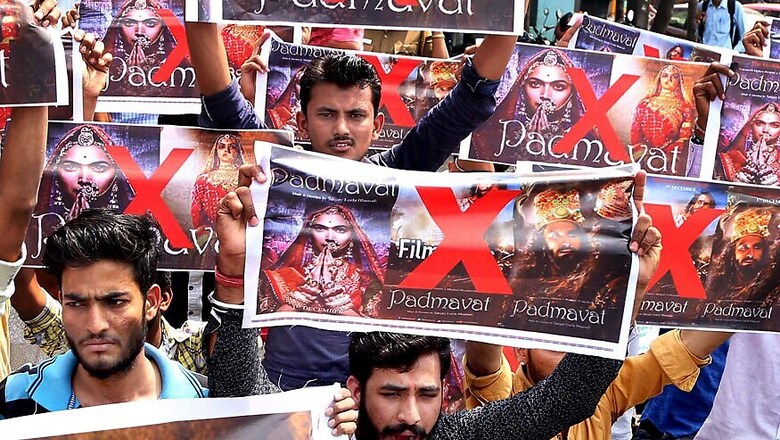
views
Let's be clear that the 21st century violence over a 14th century legend is not about honour. The furore over Padmavati has little to do with Hindu or Rajput pride and even less to do with protecting the honour of a queen whose very existence is doubtful.
She may or may not have been a figment of a Sufi poet's imagination, but the legend of Padmavati is a patriarchal construct. Sanctifying a grisly mass suicide by women, in conformance with some zany, perverted idea of 'honour', is a patriarchal conspiracy – and Sanjay Leela Bhansali plays along.
The Hindu pride brigade is no different from the anti-Romeo squads in Uttar Pradesh and elsewhere. Both equate their manhood with 'protecting' women from the 'other', infantilising and objectifying them as animated chunks of property, in need of either protection or policing. It is unfortunate that the debate centres around identity, rather than the central issue of gender.
As for Rajput pride, let's face it, many Rajput clans happily signed off on matrimonial alliances with the Mughals. It's true that the Sisodias of Mewar – the clan to which Padmavati's husband Rana Ratan Mal, belonged — did not and stubbornly refused matrimonial offers from those who did. But the princesses of Bikaner, Jaisalmer, Jodhpur and other kingdoms enjoyed connubial bliss with Akbar, the original love jihadi. This, despite the fact that the Mughal emperor, unimpressed by hundreds of women committing jauhar during the seige of 1567, thereafter massacred the entire population of Chittor (some 30,000 people).
That Bhansali should have chosen to make a film on so retrogressive a subject as Padmavati's jauhar reflects poorly on his credentials as a contemporary artiste. His attempts to bypass the misogynistic underpinnings of his material – that women are commodities to be fought over – are pathetic. More so because he cannot take refuge in historical accuracy, given that the film is patently a fantasy woven around historical characters (Ratan Singh and Alauddin Khilji). Bhansali's Khilji, naturally personifies the atavistic male urge to establish dominance by grabbing territory and/or females.
Ultimately, all Padmavati's courage, self-possession and spiritedness are in the service of male insecurity, which equates honour with the 'purity' of 'our' women. In that sense, the film typifies the worst kind of revivalism.
The very ritualism of jauhar, dressed up as a defence of honour, is a far cry from the terror-driven suicides by women during Partition, who jumped into wells to escape murderous rapists. Quite rightly, these accounts have focussed on the vulnerability of women in conflict situations, rather than the preservation of masculine pride and property.
Historically, men have always sought to co-opt women in their own subjection. The activists of the Sri Rajput Karni Sena (SRKS), an identity group which claims to protect Rajput interests, are no different. They have, tragically, recruited thousands of women styling themselves as the Jauhar Kshatrani Manch and Jauhar Smriti Sansthan, to threaten self-immolation if Padmavati is opened for public exhibition. The everyday excesses of patriarchy which undermine the well-being of women do not, in their playbook, constitute a threat to 'honour'.
Women have consented to objectification, in various forms, throughout history – whether through romanticisation of oppressive social norms or the machinations of the cosmetics industry. Padmavati represents its crudest form, with Ratan striving to prove his masculinity by safeguarding his property from a sexual predator and failing, which of course means a scorched wife policy. The 'I'll kill her before I let you have her' mindset lurks evilly under the romantic patina of the legend.
Politically, the right has nothing to gain from the indiscrimate violence perpetrated by the Karni Sena and its cohorts. A for-or-against Padmavati (or Padmaavat, in deference to the Censor Board) debate on social media is one thing, attacking a school bus full of children is quite another.
Prime Minister Narendra Modi and Home minister Rajnath Singh have the most to lose if they are shown up as incompetent on the law and order front. The Supreme Court has spoken; the state governments must honour its verdict, instead of kowtowing to violent non-state actors. Davos is unlikely to view India favourably, if the capital is in a state of siege on the eve of a film release.















Comments
0 comment